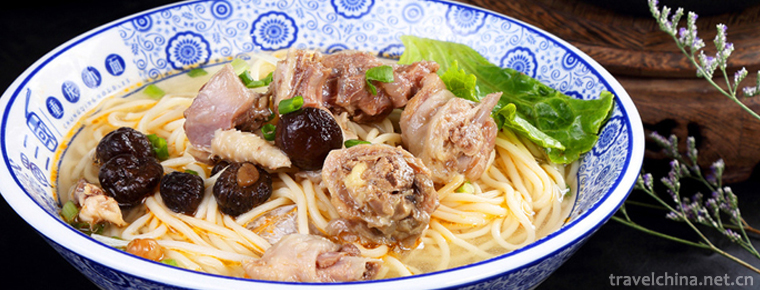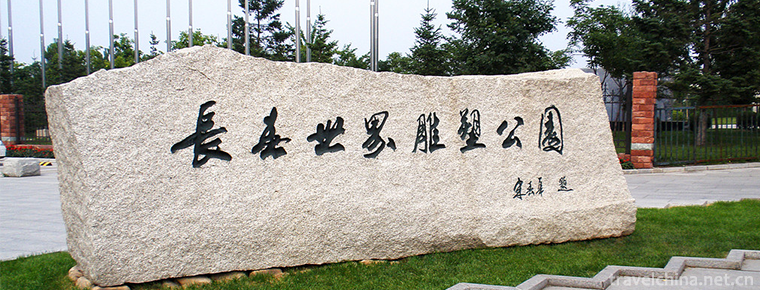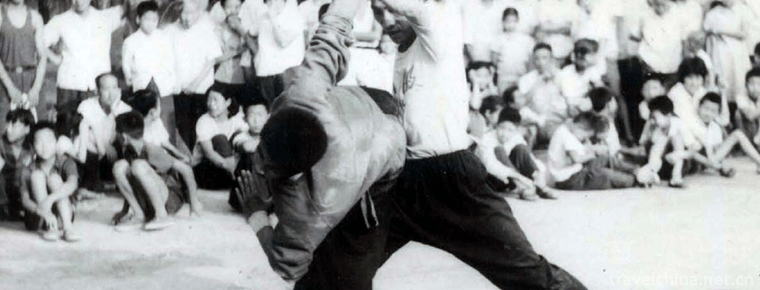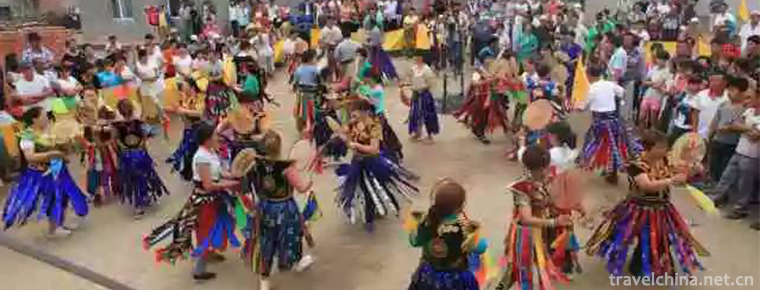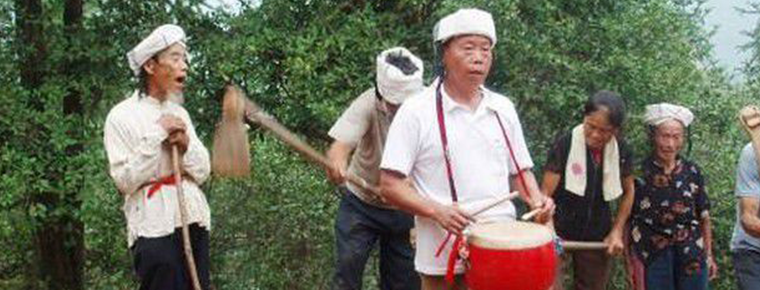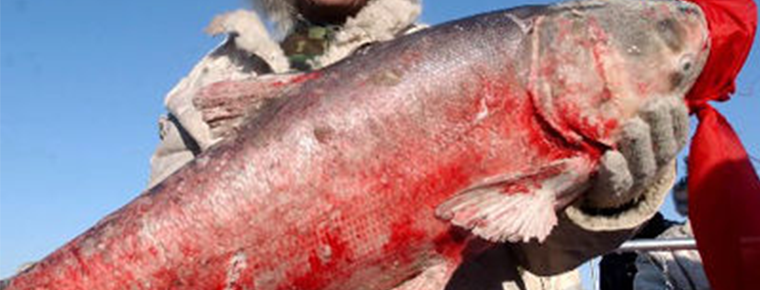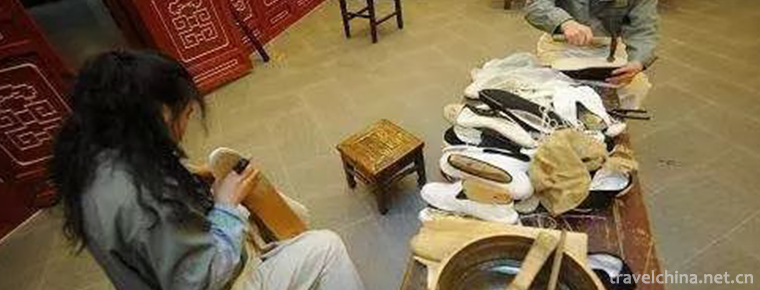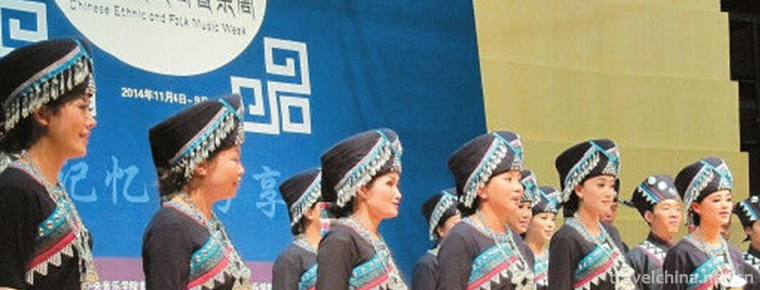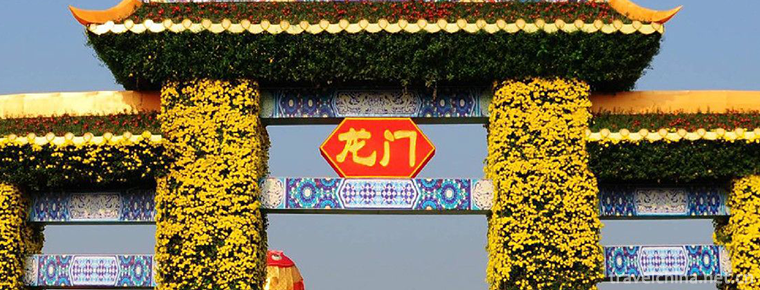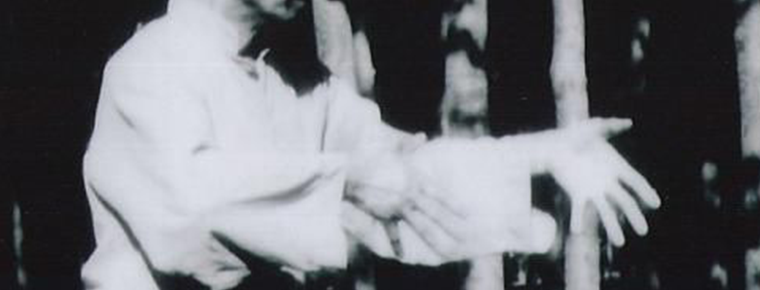Jieshou Book Club
Jieshou Book Club
The first book of the world will be a national list of intangible cultural heritage. Miaohu Book Club in Jieshou City is a unique bonsai project in its culture and art. The Miaohu Book Fair is held in Miaohu Village, Renzhai Township, Jieshou City. During the Jiaqing period of the Qing Dynasty, according to Miao Benlin, an artist who sang the fallen son Weng, launched a Miaohu rap concert. At that time, there were three singers in Miaohu Village and five in the neighbouring village. "Every now and then, singing everywhere, no one is unhappy" is the characteristics of the book club.
Every year on June 1st of the lunar calendar, the Miaohu Book Club is very lively. Many artists gather. Every artist is a play, and both inside and outside the play perform wonderful life.
In June 2008, the first declaration of Jieshou City in Anhui Province will be approved by the State Council and listed in the second batch of national intangible cultural heritage list.
historical origin
The Miaohu Book Club in Jieshou City originated in Jiaqing period of Qing Dynasty. According to the father of Miao Guanzhu, an artist who sings the song of fallen son Weng, the first Miaohu Book Club was launched. At that time, there were three singers in Miaohu Village and five in neighboring villages.
During the period of the Republic of China, Miao Wenxuan, an artist of fishing drums, regarded June 6 of the leap year as Miaohu Book Fair, and sang for five days, welcoming the masses of eight neighboring townships, which was quite lively.
From 1947 to 1948, the artist Miao Wupu handed down the Miao Lake Book Club. Since then, the Miao Lake Book Club has been silent for a time due to the fault between rappers and singers.
The reform and opening-up in 1985 brought vitality and opportunities to the Miaohu Book Club. Miao Qingchen, a famous artist of the sixth generation of Miao Guanzhu, saw that there would be new hope for the Miaohu Book Club.
Liaison with famous artists from surrounding cities and counties, supported and assisted by the Jieshou County Committee, the county government, the Propaganda Department of the county committee, the county literary federation, Renzhai Township Government and the Jieshou County Quxie Association, the first Miaohu Book Fair has been officially held, and 25 sessions have been held so far. The Miaohu Book Fair is held every five days. The audience of Fangyuan for tens of miles comes to watch the performance. It also attracted performers from dozens of miles around. Quyi artists from Cao County, Jiangsu Billion County, Dawu County of Hubei Province, Zhoukou District of Henan Province, Fuyang District, and Suzhou District came to perform in succession. During the book fair, they also held trade fairs, which attracted a large number of businessmen, effectively promoted the local material exchange and economic development, and increased the income of local farmers. Nowadays, with the impact of commodity economy tide and the infiltration of multimedia culture, Miaohu Book Club will be seriously affected. Huaibei Drum, Anhui Qinshu, pendant and so on, which are sung by Miaohu Book Club, are also disappearing day by day.
In 1939, in order to commemorate the 165th anniversary of Miao Benlin, the sixth generation of Miao Yuanpu, the founder of the first generation, designated June 6 of the leap year as the Miao Lake Book Fair. The first song was five days, and the masses of the eight neighboring villages were welcomed. Since then, the Miaohu Book will be passed on and developed to a certain extent. In the period of the Cultural Revolution, it was once silent under the influence of political movements.
In 1985, Miao Qingchen, a famous artist, contacted many famous artists from surrounding cities and counties and re-organized the Miaohu Book Fair with the support and assistance of the Jieshou Municipal Committee, the government, the Propaganda Department of the Municipal Committee, the Municipal Wenlian Zhaixiang Government and the Jieshou Municipal Quxie Association. The Miaohu Book Club is held every five days, with audiences of dozens of miles around coming to watch the performance. It also attracted performers from hundreds of miles around. Folk artists from Cao County in Shandong Province, Bixian County in Jiangsu Province, Dawu County in Hubei Province, Zhoukou District in Henan Province, and Fuyang County and Suzhou District attended the performance one after another.
The fishing drum originated from the narrative temperament of the Ming Dynasty. Later, the Taoist priests took Taoism as the theme of their speeches and spread it to the head of the circle when they preached among the people. It has a history of about 400 years. Jishou drum artists are mainly distributed in Guangwu Town, Lucun Town and Guji Town. Around 1920, it was the heyday of the development of Jishou fishing drum, which affected the area from east to Mengcheng County, West to Shenqiu County, Xincai County, Dancheng County, Taikang County, etc.
Folklore content
"Every now and then, everywhere singing, no one is happy" is the characteristics of the book club. Miaohu book club mainly sings fallen song, its repertoire includes "Golden Whip" and "Biography of a Ringing Horse". At the 28th Miaohu Book Fair, more than 40 folk opera artists staged performances. The performances included more than ten kinds of music brands, such as drums, piano books, book reviews, fishing drums, Allegro boards, pendants and sketches.
Fishing drum is one of the important songs of Miaohu Book Club. It is also called tube or pendant buzz. The jargon is "slippery blue strip". Jishou fishing drum is mainly composed of singing, supplemented by white. Because of its narrow north and south, Jishou fishing drum can be divided into "treble fishing drum" in the South and "bass fishing drum" in the north. The instruments are percussion instruments, i.e. fishing drums, drums and simple boards. Most of the songs sung are traditional bibliographies with loud and melodious voices. Nowadays, Jishou Fishing Drum Music has been included in Anhui Branch Volume of Chinese Quyi Music Integration. Some experts call it "a flower of Anhui Quyi", which is known as the "living fossil" of Yinghe River Basin. It has important cultural and artistic research value and is a fragrant flower in Chinese Quyuan.
After hundreds of years of efforts, rap and concert operas have also developed from a single fall in the past to more than 40 kinds of music, such as book reviews, fishing drums, fast books and so on. At the same time, folk dances and theatrical performances such as lions and dry boats have been added.
Main activities
On July 17, 2010, dozens of students from Fuyang Normal University Student Union came to Miaohu, the world's first place, to attend the annual Miaohu Book Fair. At this year's 26th Miaohu Book Fair, the students of Conservatory of Music brought five performances, namely "Opening Gong and drum", "crosstalk" and "Fire Story", "Lu Ban Learning and Art", "Red Moon E Dreaming" and "Little Two Gates Back" respectively.
On July 24, 2012, the Miaohu Book Fair (28th session), the national intangible cultural heritage of Renzhai Township, Jieshou City, was held as scheduled. The Miaohu Book Fair lasted for three days, and more than 40 folk opera artists from Henan, Shandong and Bozhou, Suzhou and Fuyang counties and cities of our province came to the stage to talk and perform. At the same time, in order to expand the influence of the book fair and promote the development of local folk art culture and social economy, Renzhai Township and Miaohu Village were set up. On more than 10 temporary stages, actors compete to perform. The performances included more than ten kinds of folk art brands, such as big drums, piano books, book reviews, fishing drums, Allegro boards, pendants and sketches.
On July 21, 2015, on June 6, the 31st Miaohu Book Club was held as scheduled in Miaohu Village, Renzhai Township. Nearly 40 performers from surrounding provinces, cities and counties gathered together to perform on the same stage. There are all kinds of music, such as fishing drum, drum, pendant, piano book, double reed, commentary book, Henan Opera and Allegro. "Wangjingzhou", a fishing drum performed by Miao Qingchen, a representative inheritor of the provincial non-heritage "Jishou Fishing Drum", opened the prelude of the performance. Humorous and funny Allegro "Injection", "Anyway Talk", "Shop Front", "Three Families", "People's Livelihood Project is Good", "Eight Beautiful Maps", "Bama Ling", "Golden Dove", "Zenyang Temple" and "Fengshenbang" are funny sketches, delicate and delicate pendants, thick and rough drums, elegant and euphemistic fishing drums, and more than a thousand farmers watch the performances.
Inheritance significance
Most of the songs sung at the book fair reflect new people and events emerging in the countryside since the reform and opening up. For example, programs promoting neighborhood harmony, family planning, discipline and law-abiding, and breaking superstitions. At present, 106 new repertoires have been performed. More than 150 new tracks have been created. These new songs have won the praise of the masses at all previous book conferences. The repertoire of the Miaohu Book Club, especially the props such as drum books and commentary, is simple and convenient to sing. It can pick up talents locally, and is not limited by the space and time. It is especially suitable for the taste of farmers and easy to pass on. It has been entertained by picking up ladles and potting drums.
"Say it all the time, sing everywhere, nobody is unhappy" is the first Miaohu Book Club self-entertainment important manifestation, is the original interesting true portrait. In the leisure season, after tea and dinner, a drum-book rap and singing, catharsis of the inner emotional world, or high-spirited, bright, or melodious; passionate temperament, pleasant mind, teach in fun, cultivate sentiment, especially some brilliant drum-book paragraph new works, educate people to punish evil and praise good, respect the old and love the young, and so on. In today's era of rapid development, it is still of great significance. Miaohu Book Club in Jieshou City bears the important task of the exchange and development of local folk art and rare folk music. It is also a high-quality cultural resource to establish regional brand, promote local economic development and build a new socialist countryside.
Since 1986, Miao Qingchen's senior citizens have held training courses in folk art and set up a Miao Lake folk art team. They have absorbed dozens of young people from countryside to study piano books, pendants, drums and book reviews respectively. Miao Lao compiles his own textbooks, teaches himself, teaches skills and demonstrates performances. It is understood that Zhang Li, a disciple of Miao Lao, won the first prize in the first Quyi Competition in Jieshou City, with a broad voice and full strength. Disciple Hao Xiaomei's falling son, with a hot tune and beautiful singing, is deeply loved by the local people. She sang the new catalogue "Credit Cooperatives are our backbone" at the Miaohu Book Fair and won the Excellent Performance Award at the Second Art Festival of Anhui Province. Miaohu Books should have a bright future.
Inheritance status
Speaking of Miaohu Book Club, we have to mention the contemporary founder Miao Qingchen old man.
Miao Qingchen's hale and hearty, left hand holding fan, left arm encircling two feet four inches, circumference nine inch, knob bamboo tube covered with pig skin film made of "fishing drum", singing, singing lyrics rigorous structure, vulgar, lively, simple singing, the line is round and round, starting, bearing, turning, and harmony between all show simple, deep, beautiful. "Single Knife to the Party", "Parents" and "Earthquake Unaffectionate" and other wonderful programs were welcomed by the audience.
Miao Qingchen was born in Miaohu Village, Renzhai Township, the first city in the world. This is the seat of the national intangible cultural heritage representative work "Jishou Book Club". Miao Qingchen's great grandfather Miao Benlin is the founder of the book club. When Miao Qingchen was born in 1943, there were a lot of folk performers who were good at performing folk arts, such as falling sons, fishing drums, drums, Qinshu and so on. Miao Qingchen grew up with strong interest. After graduating from junior high school in 1962, he began to concentrate on the professional study of folk art. In 1963, Miao Qingchen never left the stage. He loved performing all his life, and had a deep relationship with the art of fishing drum. He collated nearly 20 classical songs such as "Hujia Jiang", "Xiangma Zhuan", "Lajingdu", "Liver-cutting and Mother-saving", "Liu Yun Da Mu", "Long March Poetry", "Official Clearance", "Han Jinglong Banishes Cars". He created more than 10 new songs such as "Parents and Families", "Good Daughter-in-law", "Fake Bride". His performance of Jishou Yugu repertoire has won awards many times in the domestic Quyi Competition. His deeds have been reported and propagated by the news media such as Anhui Daily, Fuyang Daily and Anhui TV Station. In 1990, the fishing drum repertoire "Credit Union is our backing" won the third prize of the second Anhui Art Festival. In 1995, Jishou Fishing Drum Music included Anhui Quyi Volume, and Jishou Fishing Drum Music Volume included Chinese Quyi Music Volume. In July 2009, the drum repertoire "Thirty Years of Reform and Opening-up" won the third prize in Anhui Quyi Sketches Competition; in July 2012, the drum repertoire "Xiaogang Soul" won the third prize in performance and creation of the second Anhui Quyi Sketches Competition. Nowadays, Miao Qingchen is still the first one in the world to inherit and develop fishing drums. He is committed to publicizing and promoting the art of fishing drums, cultivating new people and inheriting skills. In order to better inherit and carry forward the Jieshou fishing drum, Miao Qingchen has compiled teaching materials and taught himself since 1986. He has held nearly 30 training courses on Jieshou fishing drum and established Jieshou fishing drum music troupe. His apprentices are all over Henan, Shandong, Fuyang, Bozhou and other provinces and cities. His apprentices are Li Guang, Xintianju, Li Libang, Yanli, Guo Yunfeng, Zhu Lixian, Miaoxinyu and Miaoxindan. More than 30 inheritors of fishing drums, including Song Dengfeng, Wang Changzheng, Wang Pengfei and Duan Baojun, have been active on the stage all the year round.
Yan Zhiwen, an 85-year-old artist, still has the same elegance and is a good performer of big drum books.
Speaking at one breath, he did not drip soup or leak water. His mouth was bursting and his voice was strong, but he could not see that he was a very old man. Yan Zhiwen, who was born at the head of the circle and grew up at the head of the circle, formed a lifelong bond with Quyi. From an early age, deeply influenced by the art of folk music, 14-year-old worshippers learn art, lead singer Dangzi and Dagu, began their own road from art. After learning Yan Zhiwen, in the field of quyi, he was like a fish in water. With his unremitting pursuit and love of art, he went south and north, and also received many disciples. The lyrics he wrote about "literacy" and "second-rate people" still don't sound meaningful.
The Miaohu June 6 rap concert attracted the storytellers from surrounding counties and cities such as Linquan, Taihe, Fuyang and Shenqiu in Henan Province to attend the rap concert. Among them, the representatives are Li Jiaoxing, Lu Yuansheng, Tian Jiaoyu in Linquan County, Wang Jiaoming in Fuyang City, Zhang Yuande and Zhang Yuancun in Taihe County. Every year, thirty or forty famous artists come to Miaohu to give their stories and performances. Because of the joining of these artists, the influence of rap concerts has rapidly extended to the Huanghuai River, and the people of a hundred miles around have come to Miaohu to hear and sing.

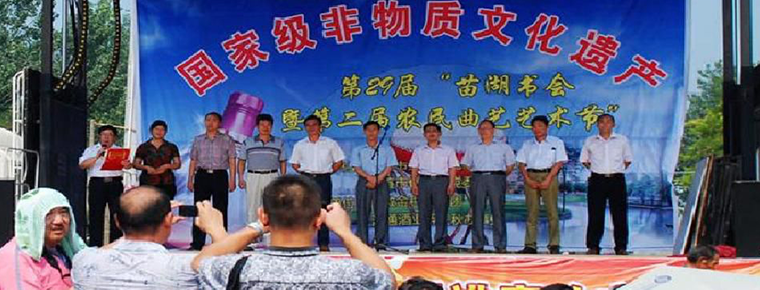
-
Letinous edodes chicken Noodles
Letinous edodes stewed chicken originated in Northern Jiangsu.
Views: 145 Time 2018-10-12 -
Changchun World Sculpture Park
Changchun World Sculpture Park is located in the south of Renmin Street in Changchun City. It covers 92 hectares, including 11.8 hectares of water. .
Views: 199 Time 2018-12-05 -
Jiulushan Waterfalls Scenic Spot
JiuRushan Waterfall Group Scenic Area - National AAAA Class Scenic Area and National Forest Park, located in Xiying Town, Jinan City, Shandong Province, is the source of Jinxiuchuan Reservoir.
Views: 204 Time 2018-12-22 -
Side wall ruins
The local people call it "Genghis Khan Wall", also known as "Jinjie Trench". It is the ancient Great Wall ruins spanning the left banner of Sunite, covering 100 square meters..
Views: 181 Time 2019-01-03 -
Eight polar boxing
Bajiquan is a kind of boxing in Chinese Wushu. The word "eight poles" of this boxing method originated from the concept of Palaeogeography and originated from the Han Dynasty.
Views: 208 Time 2019-04-02 -
Bo dance
Horqinbo dance, a primitive religious dance, is a form of Mongolian Bo (Shaman) "Xingbo" (Dancing God) and sacrifice. It is characterized by the combination of inspiration,.
Views: 371 Time 2019-04-04 -
Tea mountain chant
Yao Township Tea Hill Chant - spread in seven townships in Huangxikou area of Chenxi County, it is said that the chant song is sung when digging tea hill. When people dig tea hill.
Views: 153 Time 2019-04-15 -
Winter capture of Chagan Lake
Winter fishing in Chagan Lake, namely ice and snow fishing (or hunting) in Chagan Lake in winter, is a traditional fishery production mode (custom) in Qianguoerros Mongolian Autonomous County.
Views: 166 Time 2019-04-15 -
Manufacturing Skills of Inside Lined 1000 Layer Cloth Shoes
Inline Shoe Shoe Shoe Shoe Shoe Shoe Shop was founded in 1853 in Xianfeng, Qing Dynasty. At first, it was specially designed for the royal family and officials at all levels t.
Views: 301 Time 2019-06-07 -
Poop love song
In February 2006, a cultural census unexpectedly found "Poya Ge Shu" in Poya Village. Through expert research, 81 patterns in "Poya Ge Shu" have the character of words, and are one.
Views: 211 Time 2019-06-09 -
Xiaolan Chrysanthemum Club
Xiaolan Town, located in the middle of the Pearl River Delta, is an important town in Zhongshan City, Guangdong Province. Xiaolan has the reputation of "Chrysanthemum City". Chrysanthemum cu.
Views: 270 Time 2019-07-06 -
Yi Quan
Yiquan, also known as Dacheng Quan, is one of the traditional Chinese boxing and belongs to Neijia Quan. It comes from mind boxing. Including: standing pile, trial, footwork, strength, sound test, pus.
Views: 168 Time 2019-07-13
